This article was co-authored by Luba Lee, FNP-BC, MS. Luba Lee, FNP-BC is a Board-Certified Family Nurse Practitioner (FNP) and educator in Tennessee with over a decade of clinical experience. Luba has certifications in Pediatric Advanced Life Support (PALS), Emergency Medicine, Advanced Cardiac Life Support (ACLS), Team Building, and Critical Care Nursing. She received her Master of Science in Nursing (MSN) from the University of Tennessee in 2006.
There are 44 references cited in this article, which can be found at the bottom of the page.
wikiHow marks an article as reader-approved once it receives enough positive feedback. In this case, several readers have written to tell us that this article was helpful to them, earning it our reader-approved status.
This article has been viewed 230,455 times.
If you're feeling sluggish and under the weather, or you've had trouble losing weight you want to take off, consider cleansing your body of toxins. Cleansing the body may boost energy and mental clarity, promote weight loss, relieve pain, and prevent disease. Making dietary changes, trying a fast, exercising more, and living a chemical-free lifestyle are all effective ways to cleanse the body. Here's how to get started.
Steps
Dietary Changes
-
1Make water your main drink of choice. Nothing cleanses your body like water, which flushes toxins out of your system all day long.[1] There’s no set amount of water you should drink each day, but aim for at least 11.5 cups (2.7 L) daily if you’re a woman, and 15.5 cups (3.7 L) per day if you’re a man.[2]
- Carry a water bottle with you during the day so that you can stay hydrated on the go.
- If you have trouble drinking glass after glass of water, get hydrated by drinking decaffeinated tea or eating watery vegetables and fruits, like watermelon, apples, berries, cucumbers, tomatoes, lettuce, and carrots.
- Drinking comfortably hot water can help flush congestion out of your sinuses, and some people find that it improves their digestion.[3]
- Adding lemon to your water also helps aid digestion and gives it an anti-oxidant boost.[4] Or, try making tea or infusing water with ginger and turmeric, both of which have anti-inflammatory properties and may improve your digestion.[5]
-
2Reduce your consumption of toxin-heavy foods. Certain types of food are difficult for your body to digest and end up harming your body instead of providing nutrition. Reduce or completely avoid the following dietary toxins:
- Sugar. Sugars—especially fructose—can be hard on the liver, and consuming too much can lead to obesity and diseases such as diabetes.[6] It may be difficult to completely avoid sugar, but you can start by limiting your intake of candy, sugary baked goods, juice and soda, and granulated sugar used to sweeten tea and coffee. Satisfy your sweet tooth by consuming whole fruits, rather than fruit juice.
- Artificial sweeteners. Sugar substitutes actually lead to more sugar cravings, and can end up having an adverse effect on the body.[7] Stop drinking diet drinks and other artificially-sweetened foods.
- Saturated and trans fats. Many fats are essential to your body's health, but saturated and trans fats found in fried and processed foods can be harmful. Limit fast food, processed snack foods, and food that is served in restaurants.[8]
- Caffeine. Some studies show that drinking a few cups of coffee a day is actually good for you. However, drinking too much can cause symptoms like anxiety, an increased heart rate, trouble sleeping, and high blood pressure. Avoid drinking more than 3–5 cups (710–1,180 mL) per day, or stop drinking it completely for a while.[9] When you're focusing on cleansing your body, it's best to eliminate all unnecessary substances.
- Alcohol. Moderate alcohol consumption usually won't harm your health, but drinking too much causes weight gain, water retention, and liver disease. Stay away from alcohol when you're focusing on cleansing your body.[10]
Advertisement -
3Eat plenty of fiber. Fiber helps your digestive system function normally. Without it, your body isn't easily able to eliminate waste. During a cleanse, when you want to rid your body of toxins, its especially important to eat fiber at every meal.[11]
- Eat fruits and vegetables such as green beans, cauliflower, potatoes, and apples. Beans and other legumes, as well as whole grains such as oats and bran, are also high in fiber.
- One of the easiest and tastiest ways to get fiber into your diet is with a high-fiber smoothie.
- Cooked and raw beets are a great source of fiber, and can help improve digestive health. They can also reduce inflammation, improve blood pressure, and heal cell damage.[12]
-
4Consume a lot of greens. Leafy greens contain vitamins, minerals, and a plethora of other nutrients that help keep the body healthy. Eating greens may help improve wound healing, reduce damage to your cells, and even lower your risk of certain kinds of cancer.[13] Go for vegetables such as:
- Spinach
- Kale
- Broccoli
- Bok choy
- Mustard greens
- Seaweed[14]
Fasts
-
1Try a juice fast. There’s not a lot of scientific evidence to back it up, but juice fasts are said to cleanse the body by eliminating food that's hard to digest or toxic, and by providing the body with nutrients exclusively from fresh-squeezed fruits and vegetables. A juice fast can last anywhere from 3 days to 3 weeks.[15] Some fasters report that it leaves the body feeling refreshed and energized.
- To complete a juice fast, make your own juice with a juicer. Juicers quickly squeeze the juice (and nutrients) from fruits, vegetables, and herbs. Without this machine, juice fasting would require hours of prep work.
- Buy spinach, kale, apples, pears, lemons, carrots, ginger, and other watery fruits and vegetables to juice.
- Make enough juice in the morning to last you all day long. You should plan on having 6 to 8 glasses of juice per day to keep your hunger at bay.
- A juice fast is a pretty extreme diet, so don’t do it without talking to your doctor first—especially if you have any underlying health conditions, such as diabetes.[16] You may experience side effects while you’re on the diet, such as fatigue, stomach pain, irritability, and difficulty concentrating.[17]
-
2Consider intermittent fasting. Taking a break from eating food for half a day or up to 36 hours helps detoxify your body by creating the right conditions for autophagy—a process in which cells get rid of damaged molecules—to occur. Intermittent fasting boosts energy in the short-term and may help prevent obesity and neurological diseases.[18]
- Start by skipping lunch and dinner on a day when you don't have plans that require you to expend a lot of energy. Go to bed hungry and break your fast in the morning with a glass of water and a light breakfast.
- Work up to fasting for longer periods of time. As your body grows more used to fasting, your hunger pangs and cravings won't be as strong.
- Aim to fast for 12-16 hours between your last meal of one day and your first meal of the next. This will give your body plenty of time to rest and digest your food.
Exercises
-
1Break a sweat. Sweating isn’t the main way that your body gets rid of toxins, but it still has a ton of health benefits. For instance, studies show that sweating in a sauna can lower your blood pressure and reduce your risk of heart disease.[19] It also improves blood flow and oxygen circulation to your skin, resulting in a healthy glow.[20] Doing regular exercise that speeds up your heart rate and causes you to sweat for 30 minutes or more is a great way to improve your overall health.
- Do some cardio. Biking, running, power walking, and swimming are excellent cardio exercises that can help you break a sweat. Try to get at least 150 minutes of cardio per week (or about 30 minutes a day on most days).[21]
- Lift weights. Weight training keeps your body strong and toned, improving your overall health. Incorporate 2 or 3 days of weight training into your exercise routine.
- Don't exercise too much during juice fasts and intermittent fasts. Burning too many calories when you aren't taking in a lot of calories from your diet may cause you to feel weak or faint.
- If you can’t exercise for whatever reason, try hitting the sauna. This is a great way to break a healthy sweat while also resting and relaxing. Infrared saunas may be particularly beneficial to your health, and they can help you break a sweat at a much lower temperature than a traditional sauna.[22]
-
2Try self-massage to reduce stress and pain. Massage has a wide variety of health benefits. It can loosen up tired muscles, reduce pain, and help you relax. Plus, there’s evidence that it can improve your digestive health, making it easier for your body to get rid of waste.[23] To massage yourself, gently rub, knead, or press on any part of your body where you feel tightness or tension.
- You can also use tools, such as massage rollers, massage balls, or household items like tennis balls or water bottles.
- Don’t massage any areas where your skin is broken or inflamed, or where you’ve had a recent surgery or injury. Avoid self-massage if you think you may have a blood clot. Ask your doctor first if you’re not sure whether self-massage is safe for you.[24]
-
3Do Pranayama breathing exercises. Pranayama is a form of yoga that focuses on controlling the breath. Studies show that Pranayama breathing has a variety of health benefits, including decreasing stress, reducing heart rate, and lowering blood pressure.[25] Try the following exercise to get started:[26]
- Sit in a comfortable position. Gently close your right nostril with your thumb and slowly breathe in through your left nostril.
- Close your left nostril with your ring and little fingers.
- Release your right nostril, and slowly breathe out through the right side.
- Repeat this process 3-5 times.
-
4Practice yoga. Some yoga practitioners claim that yoga can detoxify the body by facilitating the removal of lactic acid, carbon dioxide, and lymphatic fluids from the system. Unfortunately, there’s not a lot of evidence for this.[27] However, yoga is definitely good for your body—it can help reduce stress, ease pain, increase flexibility and strength, and improve your circulation and heart health.[28]
- Try inversion positions like the downward facing dog pose, which aids in blood circulation by placing the heart higher than the head.[29]
- Place your legs on the wall to increase blood flow to the abdomen and stimulate the digestive system.
Lifestyle Choices
-
1Don't use tobacco or take drugs. The chemicals and additives that come with tobacco are toxic to the body, and smoking in any form leads to respiratory diseases.[30] Other recreational drugs can also be damaging to your body. To cleanse your body, eliminate the following substances from your life:[31]
- Tobacco in all its forms, including cigarettes, cigars, pipe tobacco, and chewing tobacco. Smoking marijuana is also harmful to the lungs, and marijuana may contain chemicals that are toxic to the body.
- Other drugs like cocaine, heroin, and methamphetamine (crystal meth) are addictive and highly destructive to the body.
-
2Avoid exposing yourself to chemicals. Harmful chemicals found in plastics and other substances are tied to cancer and other diseases. It's difficult to live completely free of toxic chemicals, since they're present in our food, clothing, furniture, air, and water.[32] Do your best to live a chemical-free life by taking the following measures:
- Eat organic food. Ingesting pesticides that are sprayed on produce can be harmful to your health. Choose organic produce and organic, hormone-free meat and eggs.[33]
- Research the fish you eat to make sure it doesn't contain high levels of mercury and other heavy metals.[34]
- Choose natural fabrics like cotton and silk instead of wearing polyester, which can contain high amounts of irritating chemicals, such as antimony.[35] When possible, wear organic clothing and use organic linens and towels.
- Use soap, shampoo, conditioner, and makeup made with natural substances instead of harsh chemicals. Look for products that are free of dyes and perfumes.[36]
- Use natural solutions, like vinegar and water, to clean your house, rather than relying on chemicals like bleach and other commercial cleaning agents.
-
3Limit stress. Stress is a form of mental toxin that can be just as harmful as toxins from your environment. It causes a rise in blood pressure and the production of hormones that lead to weight gain. Limit stress by eliminating unnecessary activities from your schedule and making time to do things that you enjoy.[37]
- Getting plenty of sleep helps relieve stress. Make sure you get at least 7 or 8 hours a night.
- If your stress seems unmanageable, consider seeing a therapist for help. A therapist will be able to teach you effective stress management techniques.
- Spend time with people supportive friends and family, and reduce your time around people who behave in toxic ways or raise your stress levels.
-
4Practice oil pulling to improve oral hygiene. Oil pulling is a traditional practice with its origins in ancient India. Ayurvedic medicine practitioners claim that it can cleanse the body by drawing out toxins through the salivary glands. To practice oil pulling, swish 1 tablespoon (15 mL) of a vegetable-based oil, such as sunflower, olive, or coconut oil, in your mouth for about 20 minutes before breakfast. When you’re done, spit the oil out in a trashcan or paper towel to avoid clogging your pipes.[38]
- There’s not a lot of scientific information about the benefits of oil pulling, but it may help cleanse harmful bacteria and plaque from your mouth.
- After pulling, brush your teeth and tongue, then rinse your mouth thoroughly.
-
5Try neem supplements to boost oral health. Neem is a traditional medicine that may improve digestive health and help prevent gum and tooth disease.[39] It also has anti-inflammatory and anti-oxidant properties.[40] Talk to your doctor about trying neem extract supplements.
- Ask your doctor to recommend a safe dose of neem. Taking too much may cause side effects, such as irregular heart rhythms or vision loss.[41]
-
6Dry brush your skin to exfoliate and remove dirt. Dry brushing your skin helps remove dead skin cells, dirt, and bacteria that can clog up your pores and cause breakouts. Use a brush made with natural bristles (such as horse hair or sisal) and gently sweep it over your skin, moving from the ends of your limbs toward your body. When you’re done, hop in the shower to wash away loose skin cells and contaminants.[42]
- Proponents of dry brushing also claim that it can improve blood circulation and lymphatic flow, and that it stimulates the nervous system.
-
7Boost your immune system with a contrast shower. Naturopathic medicine practitioners believe that contrast showers—which involve alternating between hot and cold water temperatures as you shower—can help improve immune system function and make you less likely to get sick.[43] Contrast showers may also help you recover faster after intense exercise.[44] To take a contrast shower:
- Let the water get as hot as you can tolerate for about 2-3 minutes.
- Switch to cold water for about 15 seconds.
- Keep alternating between the 2 temperatures for 3-4 cycles. End on the cold cycle. Dry off with a clean towel when you’re done.
Warnings
- Stevia is often suggested as a natural sugar replacement during the body cleansing process. Be sure to understand the side effects, as well as the benefits, of consuming this sugar substitute.[45]⧼thumbs_response⧽
References
- ↑ https://www.cdc.gov/healthyweight/healthy_eating/water-and-healthier-drinks.html
- ↑ https://www.mayoclinic.org/healthy-lifestyle/nutrition-and-healthy-eating/in-depth/water/art-20044256
- ↑ https://health.clevelandclinic.org/are-there-health-benefits-to-drinking-hot-water/
- ↑ https://health.clevelandclinic.org/7-reasons-to-start-your-day-with-lemon-water-infographic/
- ↑ https://www.healthyfamiliesbc.ca/home/blog/ginger-and-turmeric-how-do-i-use-them-and-what-are-their-health-benefits
- ↑ https://www.bbcgoodfood.com/howto/guide/sugar-explained
- ↑ http://www.health.harvard.edu/blog/artificial-sweeteners-sugar-free-but-at-what-cost-201207165030
- ↑ https://www.nhs.uk/live-well/eat-well/different-fats-nutrition/
- ↑ https://www.hopkinsmedicine.org/health/wellness-and-prevention/9-reasons-why-the-right-amount-of-coffee-is-good-for-you
- ↑ https://www.alcohol.org/faq/safe-level-of-drinking/
- ↑ https://www.mayoclinic.org/healthy-lifestyle/nutrition-and-healthy-eating/in-depth/fiber/art-20043983
- ↑ https://health.clevelandclinic.org/the-health-benefits-of-beets/
- ↑ https://www.ars.usda.gov/plains-area/gfnd/gfhnrc/docs/news-2013/dark-green-leafy-vegetables/
- ↑ https://www.bbcgoodfood.com/howto/guide/health-benefits-seaweed
- ↑ https://www.cbsnews.com/news/read-this-before-you-begin-that-juice-fast/
- ↑ https://www.mayoclinic.org/healthy-lifestyle/nutrition-and-healthy-eating/expert-answers/detox-diets/faq-20058040
- ↑ https://www.cbsnews.com/news/read-this-before-you-begin-that-juice-fast/
- ↑ http://www.scientificamerican.com/article.cfm?id=how-intermittent-fasting-might-help-you-live-longer-healthier-life&page=2
- ↑ https://www.uwhealth.org/news/sauna-induced-sweating-offers-many-health-benefits
- ↑ https://www.piedmont.org/living-better/the-health-benefits-of-sweating
- ↑ https://www.mayoclinic.org/healthy-lifestyle/fitness/expert-answers/exercise/faq-20057916
- ↑ https://www.mayoclinic.org/healthy-lifestyle/consumer-health/expert-answers/infrared-sauna/faq-20057954
- ↑ https://health.usnews.com/health-news/health-wellness/slideshows/10-reasons-you-should-try-self-massage?slide=9
- ↑ https://www.sitcm.edu.au/wp-content/uploads/vet/V2.%20Learning%20Materials/SPE-1/Contraindications%20for%20Massage%20Therapy.pdf
- ↑ https://www.ncbi.nlm.nih.gov/pmc/articles/PMC3734635/
- ↑ https://www.yogajournal.com/poses/types/pranayama/channel-cleaning-breath/
- ↑ https://www.theguardian.com/science/sifting-the-evidence/2014/jan/13/demystifying-detox-can-yoga-really-cleanse-the-liver
- ↑ https://www.hopkinsmedicine.org/health/wellness-and-prevention/9-benefits-of-yoga
- ↑ https://thewholeu.uw.edu/2015/09/28/yoga-for-longevity/
- ↑ https://www.mayoclinic.org/diseases-conditions/nicotine-dependence/symptoms-causes/syc-20351584
- ↑ https://www.mayoclinic.org/diseases-conditions/drug-addiction/symptoms-causes/syc-20365112
- ↑ https://www.atsdr.cdc.gov/emes/public/docs/How%20to%20Reduce%20Your%20Exposure%20to%20chemicals%20at%20home%20work%20and%20play%20fs.pdf
- ↑ https://www.helpguide.org/articles/healthy-eating/organic-foods.htm
- ↑ https://www.fda.gov/food/consumers/advice-about-eating-fish
- ↑ https://pubmed.ncbi.nlm.nih.gov/25889781/
- ↑ https://www.dermatologytimes.com/view/the-state-of-natural-skincare
- ↑ https://www.mayoclinic.org/healthy-lifestyle/stress-management/in-depth/stress-symptoms/art-20050987
- ↑ https://www.ncbi.nlm.nih.gov/pmc/articles/PMC5198813/
- ↑ https://wa.kaiserpermanente.org/kbase/topic.jhtml?docId=hn-4372000
- ↑ https://www.ncbi.nlm.nih.gov/pmc/articles/PMC4791507/
- ↑ https://www.drugs.com/npp/neem.html
- ↑ https://health.clevelandclinic.org/the-truth-about-dry-brushing-and-what-it-does-for-you/
- ↑ https://blog.nuhs.edu/naturopathic-student/hydrotherapy-contrast-shower
- ↑ https://pubmed.ncbi.nlm.nih.gov/24531433/
- ↑ https://www.mayoclinic.org/healthy-lifestyle/nutrition-and-healthy-eating/expert-answers/stevia/faq-20057856
About This Article
One way you can cleanse your body is by drinking plenty of water throughout the day, which prevents toxins from building up in your body. You should also eat plenty of fiber, which can be found in foods like green beans, cauliflower, potatoes, and apples, since this is vital to your digestive system. However, try to cut down on foods that contain sugar, saturated fats, caffeine, and alcohol, since these are hard for your body to digest and can be harmful in large amounts. Try to avoid tobacco and other drugs too, since these often contain harmful toxins. In addition to eating a healthy diet, try to do regular exercise for at least 30 minutes at a time, since your body gets rid of toxins through sweat. For more tips, including how to cleanse your body of stress hormones, read on!
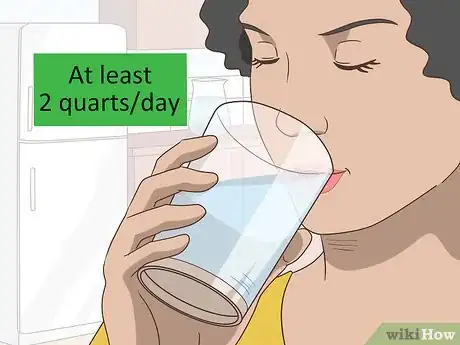
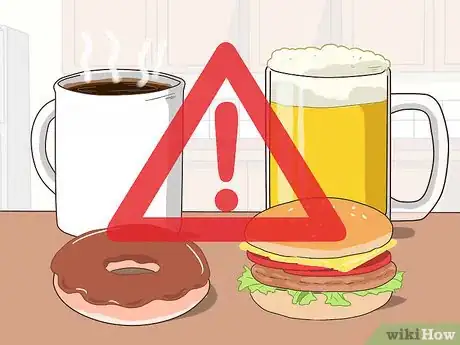
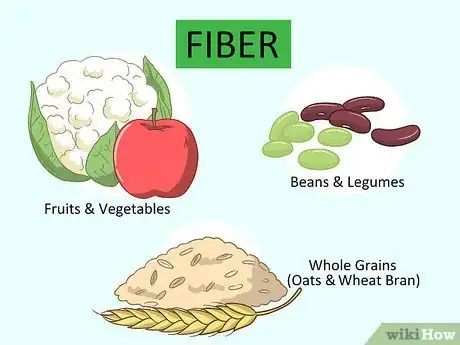
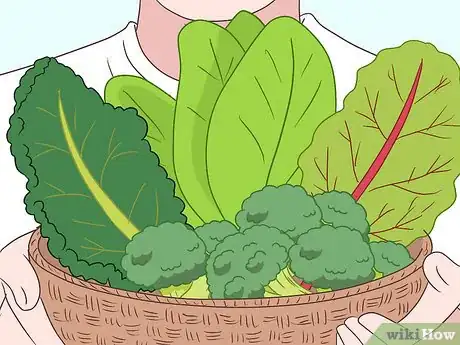
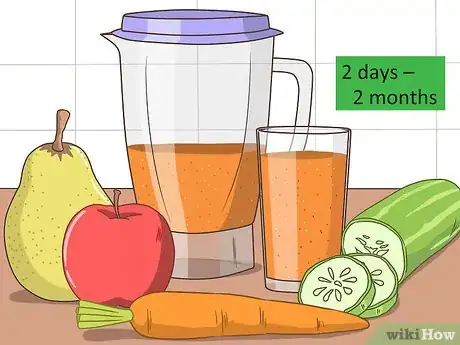
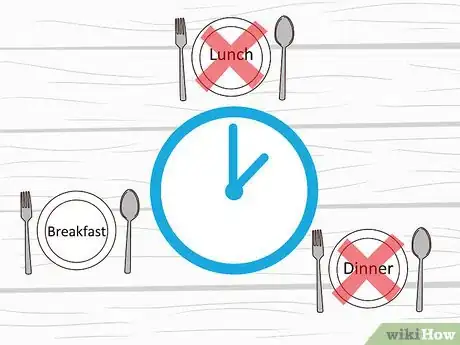

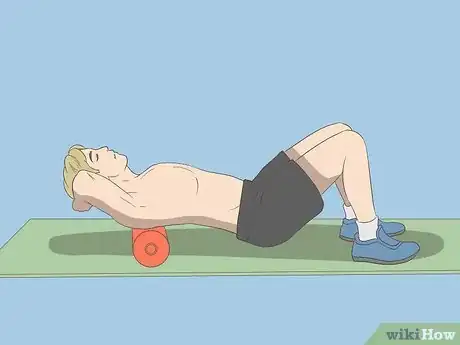
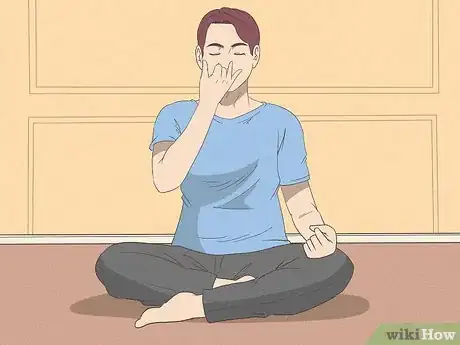
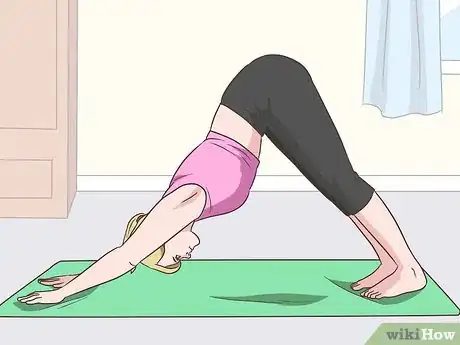

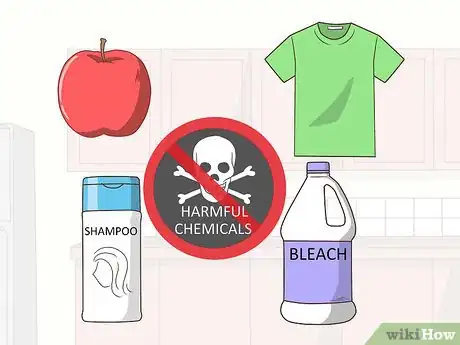

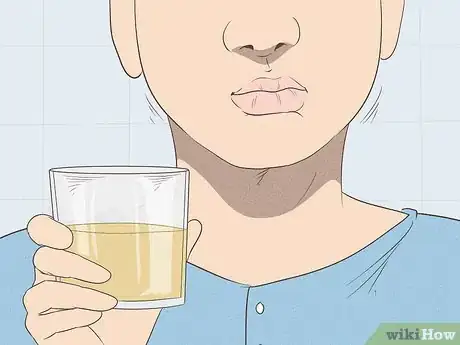


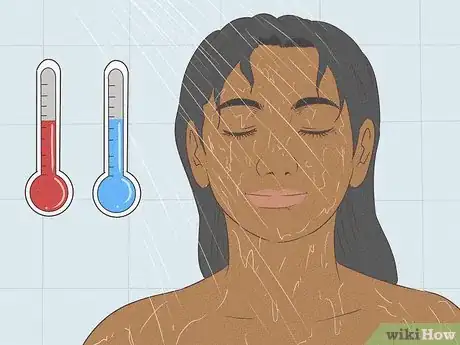
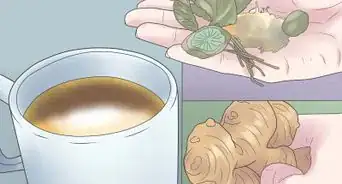




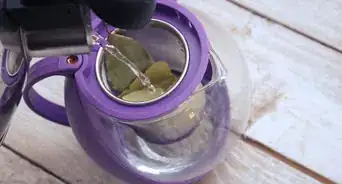

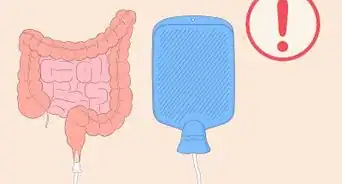













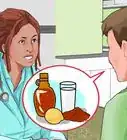





































Medical Disclaimer
The content of this article is not intended to be a substitute for professional medical advice, examination, diagnosis, or treatment. You should always contact your doctor or other qualified healthcare professional before starting, changing, or stopping any kind of health treatment.
Read More...